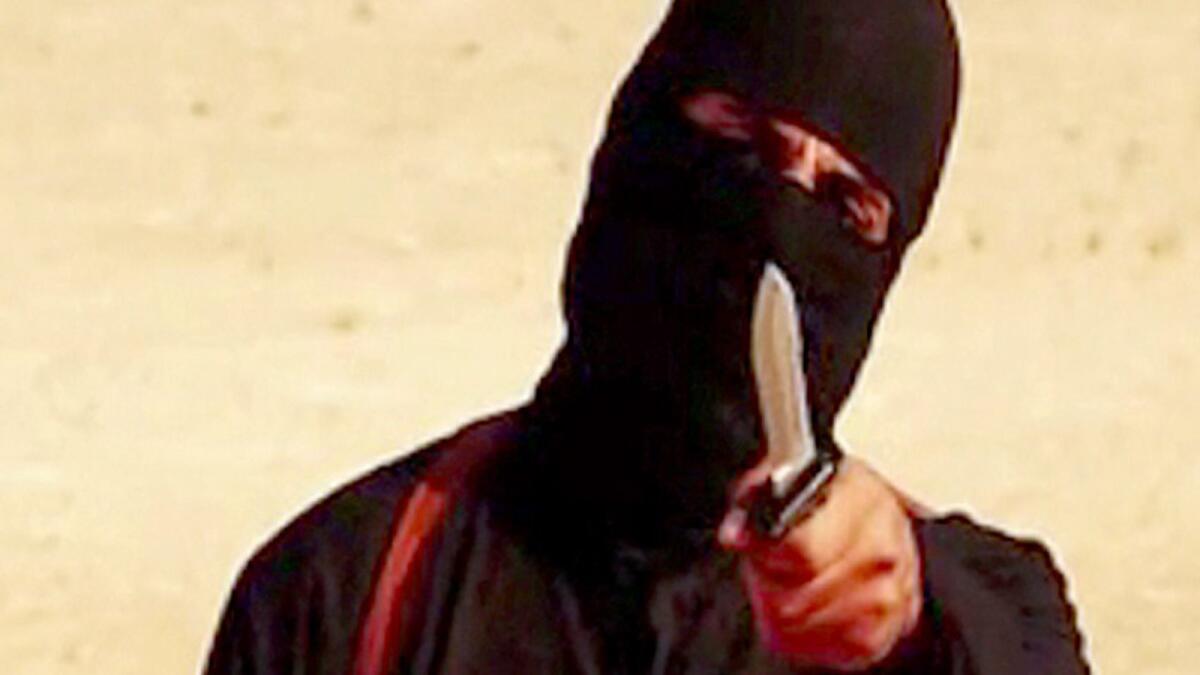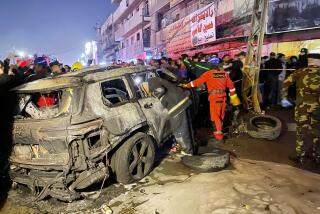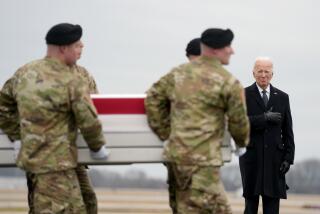Pentagon believes ‘Jihadi John’ killed by U.S. drone attack

A frame from a video released by Islamic State shows the masked militant “Jihadi John” before beheading U.S. hostage Steven Sotloff.
When a man believed to be the notorious militant known as “Jihadi John” traveled this week through the outskirts of Raqqah, the Islamic State stronghold in Syria, U.S. drones were watching.
Three MQ-9 Reapers high overhead tracked him for more than 24 hours with infrared cameras and other sensors. U.S. officials were watching the feed from afar when he stepped out of a building around midnight Thursday and climbed into a vehicle with a driver.
With no civilians in sight, the kill order was given. Two Hellfire missiles — one, then the other — dropped from the remote-controlled aircraft’s wings and streaked down from the night sky, obliterating the vehicle.
The Pentagon is “reasonably certain” that the missiles killed Mohammed Emwazi, the 27-year-old British citizen known as Jihadi John, according to Army Col. Steve Warren, spokesman for the U.S.-led military coalition in Baghdad.
To many in the West, Emwazi became the savage face of Islamic State after he appeared in gruesome videos wearing a black balaclava, speaking with a British accent and brandishing a long knife above bound and terrified hostages clad in orange jumpsuits.
He was suspected in the beheadings of American journalists James Foley and Steven Sotloff, as well as the killings of American aid worker Abdul-Rahman Kassig, British aid workers David Haines and Alan Henning, and Japanese journalist Kenji Goto.
Their families responded with a mixture of relief, bitterness and shock Friday.
“If only so much effort had been given to finding and rescuing Jim and the other hostages who were subsequently murdered by ISIS, they might be alive today,” John and Diane Foley, Foley’s parents, said in a statement, using an acronym for Islamic State.
“This development doesn’t change anything for us; it’s too little too late,” Sotloff’s parents, Art and Shirley Sotloff, said. “Our son is never coming back.”
“He was only a pawn in ISIS’ stupid game, but knowing it’s over, that he’s finally dead, still hasn’t sunk in,” said Bethany Haines, David Haines’ daughter, according to the BBC.
U.S. officials said they still had not confirmed Emwazi’s death, but intelligence agencies were searching militants’ social media and other electronic “chatter” for possible evidence.
“We know for a fact that the weapons system hit its intended target and the personnel who were on the receiving end of that weapons system were in fact killed,” Warren said in a teleconference at the Pentagon. “We still have to finalize the verification that those personnel were specifically who we thought they were.”
“We’re still in the process of trying to conclusively determine that he was killed,” said another U.S. official, who spoke on condition of anonymity to discuss the operation. “We don’t have anyone on the ground to get a DNA swab.”
U.S. and British authorities declined to say Friday how they managed to identify their target, and whether it involved an informant with the extremist group or other surveillance. But they made no apologies for trying to kill him.
“Certainly the role that Mr. Emwazi has played in radicalizing individuals around the world, and inspiring individuals to join their cause made him a threat not just to the region, but to countries around the world,” Josh Earnest, the White House spokesman, told reporters.
In London, Prime Minister David Cameron said British authorities had worked “hand in glove” with U.S. agencies to search for Emwazi.
“We have been working with the United States literally around the clock to track him down,” Cameron told journalists outside 10 Downing Street. “This was a combined effort, and the contribution of both our countries was essential.”
As Islamic State’s “lead executioner,” Cameron said, Emwazi was responsible for the deaths of Muslims as well as non-Muslims.
“He was intent on murdering many more people,” he said. “So this was an act of self-defense. It was the right thing to do.”
Opposition leader Jeremy Corbyn said Emwazi had been brought to account “for his callous and brutal crimes.”
But Corbyn, who has led the Labor Party for less than three months, caused a stir by saying that it would have been “far better” if Emwazi had been brought to trial.
Britain’s right-wing media immediately slammed Corbyn as a dangerous left-winger, calling him soft on terrorism. Some of Corbyn’s own party colleagues distanced themselves from his comments.
“Look, why couldn’t the police just go and arrest Emwazi? It’s not as if it’s a really dangerous war zone & I’m sure he’d have come quietly,” Labor lawmaker Ian Austin said on Twitter.
Because he was a high-profile figure, Emwazi’s death would represent a symbolic victory for the U.S.-led military campaign against Islamic State, which has been at a tactical stalemate in Iraq and Syria for months.
But he was not known as a military commander, so his elimination is unlikely to produce a strategic shift on the battlefield.
Emwazi was one of several Islamic State captors who apparently controlled the group’s foreign hostages. They were dubbed “the Beatles” because of their British accents, and Emwazi was called John.
The drone strike came as the Obama administration and its allies have boosted efforts against Islamic State on several fronts.
U.S. airstrikes backed a Kurdish ground offensive that cut off Islamic State supply routes in northern Iraq and apparently recaptured the embattled town of Sinjar this week, while the U.S. stepped up deliveries of arms and ammunition to rebel groups in northeast Syria.
The conflict has grown in intensity in the six weeks since Russia began launching airstrikes in support of forces loyal to Syrian President Bashar Assad in the country’s multisided civil war.
On Saturday, President Obama will fly to neighboring Turkey for a two-day G-20 summit that will focus in part on the widening civil war in Syria, now in its fifth year.
Emwazi was born in Kuwait and grew up in London as a soccer-playing schoolboy who earned a computer programming degree at the University of Westminster.
His transformation to extremist appears to have begun in 2009 when he was detained in Tanzania on what he said was a vacation with two friends.
Asim Qureshi, research director for CAGE, a London-based advocacy organization with an Islamic focus, told reporters in February that Emwazi was suspected of attempting to join the Somali militant group Shabab.
Qureshi said Emwazi was repeatedly questioned by British security officers, who on one occasion, he said, threw Emwazi against a wall, grabbed at his beard and choked him. Emwazi was ultimately sent back to Britain.
British authorities later prevented Emwazi from moving to Kuwait, where he said he had a job waiting, and cost him two fiancees, Qureshi said.
It’s still unclear how or when Emwazi was able to travel to Syria.
On Friday, Dr. Adnan Siddiqui, director of CAGE, said U.S. and British authorities still need to explain why they failed to rescue the hostages.
“CAGE has acknowledged mistakes were made in our handling of the Emwazi affair, but we reiterate our call for a full inquiry into what caused Emwazi to feel so alienated in the U.K. that he felt his only option was to leave,” he said. “Such an inquiry is essential if we are to understand and put an end to individuals being drawn into political violence.”
Hennigan reported from Washington and Zavis from Los Angeles. Times staff writer Henry Chu in London contributed to this report.
Follow @wjhenn for military and defense information
ALSO:
Aung San Suu Kyi’s party wins a historic majority in Myanmar parliament
In India, Mumbai’s mountains of imported coal pose health hazard
Seven years on, deeper U.S. commitment to Asia eludes Obama
More to Read
Start your day right
Sign up for Essential California for news, features and recommendations from the L.A. Times and beyond in your inbox six days a week.
You may occasionally receive promotional content from the Los Angeles Times.








